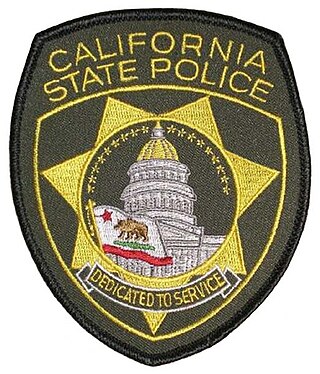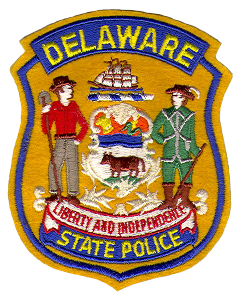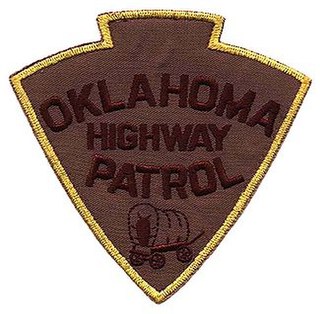
A courthouse or court house is a structure which houses judicial functions for a governmental entity such as a state, region, province, county, prefecture, regency, or similar governmental unit. A courthouse is home to one or more courtrooms, the enclosed space in which a judge presides over a court, and one or more chambers, the private offices of judges. Larger courthouses often also have space for offices of judicial support staff such as court clerks and deputy clerks.

Security police usually describes a law enforcement agency which focuses primarily on providing security and law enforcement services to particular areas or specific properties. They may be employed by governmental, public, or private institutions. Security police are generally considered distinct from security guards as security police personnel typically hold some level of law enforcement authority. The exact powers held by security police vary widely between jurisdictions. Examples of these types of agencies include the U.S. FBI Police, the Indian Central Industrial Security Force, and the British Civil Nuclear Constabulary.

The California State Police (CSP) was a state level security police agency founded on March 15, 1887 which primarily served to protect the State Capitol Building, the Governor and other state officials, and other state agencies that did not have their own police force. The CSP also provided services to many different California state agencies, including performing tax seizures for the California Franchise Tax Board and Board of Equalization, as well as patrolling the California Aqueduct. They provided investigative services to elected officials through their Threat Assessment Detail and criminal investigations of crimes committed against the state through the Bureau of Investigative Services. Detectives and line officers routinely conducted investigations with other state agencies and allied law enforcement departments. The California State Police merged with the California Highway Patrol in 1995.

Charles Layman Terry Jr. was an American lawyer and politician from Dover, in Kent County, Delaware. He was a member of the Democratic Party and served as Chief Justice of the Delaware Supreme Court as well as Governor of Delaware.

The Federal Protective Service (FPS) is a federal law enforcement agency of the United States Department of Homeland Security (DHS). It is also "the federal agency charged with protecting and delivering integrated law enforcement and security services to facilities owned or leased by the General Services Administration (GSA)"—over 9,000 buildings—and their occupants.

The Pennsylvania State Police (PSP) is the state police agency of the U.S. state of Pennsylvania, responsible for statewide law enforcement. The Pennsylvania State Police is a full service law enforcement agency which handles both traffic and criminal law enforcement. The Pennsylvania State Police was founded in 1905 by order of Governor Samuel Pennypacker, by signing Senate Bill 278 on May 2, 1905. The bill was signed in response to the Great Anthracite Strike of 1902. Leading up to the Anthracite Strike, private police forces were used by mine and mill owners to stop worker strikes. The inability or refusal of local police or sheriffs' offices to enforce the law, directly influenced the signing of Bill 278. The Anthracite Strike lasted from May 15 to October 23, 1902, and ended with the help of Theodore Roosevelt, the sitting president at the time.

The Delaware State Police (DSP) is a division of the Delaware Department of Public Safety and Homeland Security and is responsible for traffic regulation and law enforcement across the state of Delaware, especially in areas underserved by local police departments. The DSP is headquartered in the capital Dover, Delaware.

The Supreme Court of the United States Police is a federal law enforcement agency that derives its authority from 40 U.S.C. § 6121. The Supreme Court Police enforces federal and District of Columbia laws and regulations, as well as enforces regulations governing the Supreme Court Building and grounds prescribed by the marshal and approved by the Chief Justice of the United States. The department's mission is to ensure the integrity of the constitutional mission of the Supreme Court of the United States by protecting the Supreme Court, the justices, employees, guests, and visitors.

The Oklahoma Highway Patrol (OHP) is a major state law enforcement agency of the government of Oklahoma. A division of the Oklahoma Department of Public Safety, the OHP has traffic enforcement jurisdiction throughout the state. OHP was legislatively created on July 1, 1937, due to the growing problem of motor vehicle collisions, the expansion of highway systems, and the increase in criminal activities.

The Texas Highway Patrol is a division of the Texas Department of Public Safety and is the largest state-level law enforcement agency in the U.S. state of Texas. The patrol's primary duties are enforcement of state traffic laws and commercial vehicle regulation, but it is a fully empowered police agency with authority to enforce criminal law anywhere in the state. Highway patrol troopers are also responsible for patrolling the state Capitol Complex in Austin and providing security to the governor. The current Chief is Lieutenant Colonel Dwight Mathis.

The Delaware Division of Alcohol and Tobacco Enforcement (DATE) is a law enforcement agency of the State of Delaware and is a division of the Delaware Department of Safety and Homeland Security (DSHS).

First State Heritage Park is Delaware's first urban "park without boundaries" linking historic and cultural sites in Dover, Kent County, Delaware, the city that has been the seat of state government since 1777. It is a partnership of state and city agencies under the leadership of Delaware State Parks. Delaware was the first state to ratify the United States Constitution. The sites of the park highlight Delaware's role as the First State. First State Heritage Park is open year-round, with special tours of the sites given the first Saturday of each month.

In the United States, a sheriff is the chief of law enforcement of a county. Sheriffs are usually either elected by the populace or appointed by an elected body.

The Maryland Natural Resources Police (NRP) is the law enforcement arm of the Maryland Department of Natural Resources (DNR), tasked with enforcing laws on the state's public lands and waterways, protecting fish and wildlife, and leading search and rescue efforts. The Natural Resources Police is also the state's maritime homeland security agency.

The Alberta Sheriffs Branch is a provincial law enforcement agency overseen by the Ministry of Public Safety and Emergency Services of the province of Alberta, Canada. Under the authority of the Peace Officer Act, Alberta Sheriffs are provincial peace officers with jurisdiction over the province of Alberta. The premier of Alberta has the authority to grant emergency police powers to all Alberta sheriffs during major emergencies within the province. The Alberta Sheriffs Branch is the largest sheriff service in Canada.

The Florida Department of Law Enforcement (FDLE) is a state-wide investigative law enforcement agency within the state of Florida. The department formally coordinates eight boards, councils, and commissions. FDLE's duties, responsibilities, and procedures are mandated through Chapter 943, Florida Statutes, and Chapter 11, Florida Administrative Code. FDLE is headed by a commissioner who reports to the Florida Cabinet, which is composed of the governor, the attorney general, the chief financial officer, and the commissioner of agriculture. The commissioner is appointed to his position by the governor and cabinet and confirmed by the Florida Senate.

In the United States, the state police is a police body unique to each U.S. state, having statewide authority to conduct law enforcement activities and criminal investigations. In general, state police officers or highway patrol officers, known as state troopers, perform functions that do not fall within the jurisdiction of the county sheriff, such as enforcing traffic laws on state highways and interstate expressways, overseeing the security of the state capitol complex, protecting the governor, training new officers for local police forces too small to operate an academy and providing technological and scientific services. They support local police and help to coordinate multi-jurisdictional task force activity in serious or complicated cases in those states that grant full police powers statewide.

The Baltimore City Sheriff's Office is the law enforcement arm of the Circuit Court of Maryland, serving Baltimore, Maryland. The office is headquartered in Courthouse West of the Baltimore City Circuit Courthouses, which also serves as the sites for Baltimore City branch of the Circuit Court of Maryland.

The Wisconsin State Capitol Police is a police force maintained by the Wisconsin Department of Administration, and is responsible for policing the Wisconsin State Capitol, state government facilities and the protection of the Governor and Lieutenant Governor of Wisconsin.




























